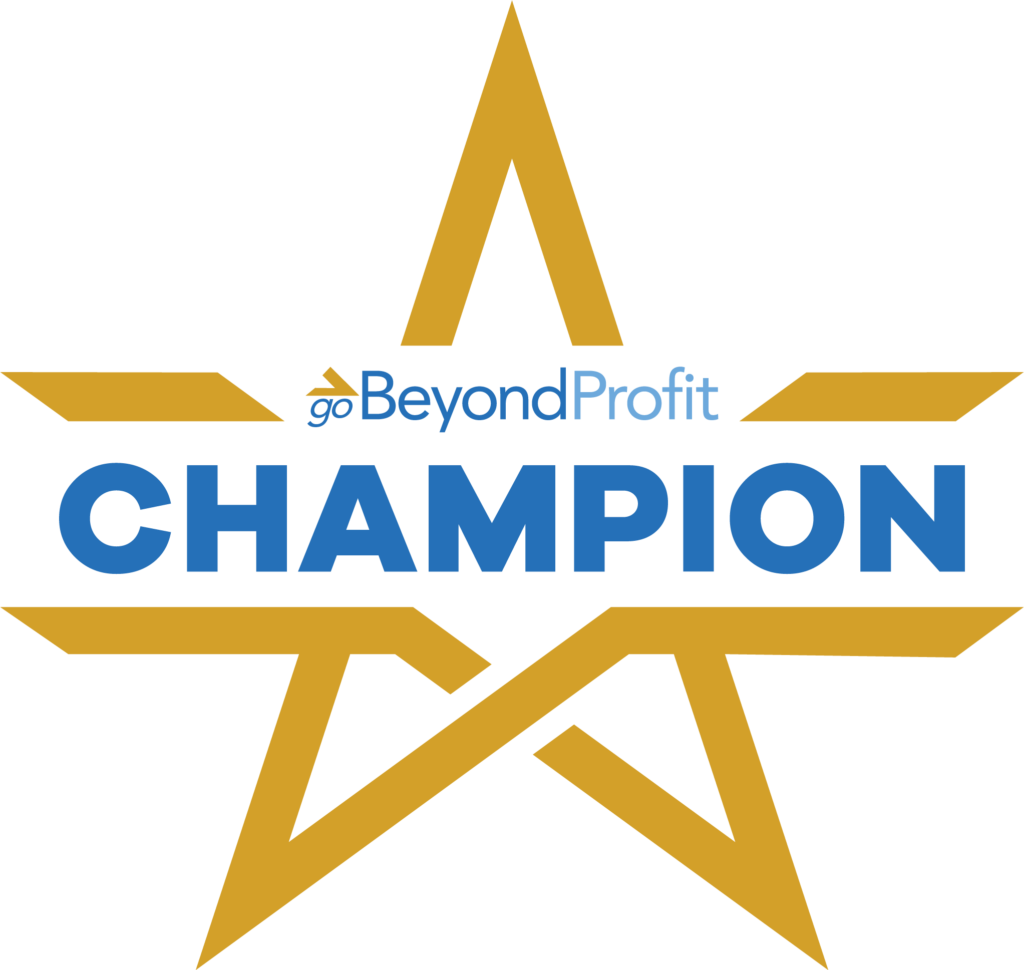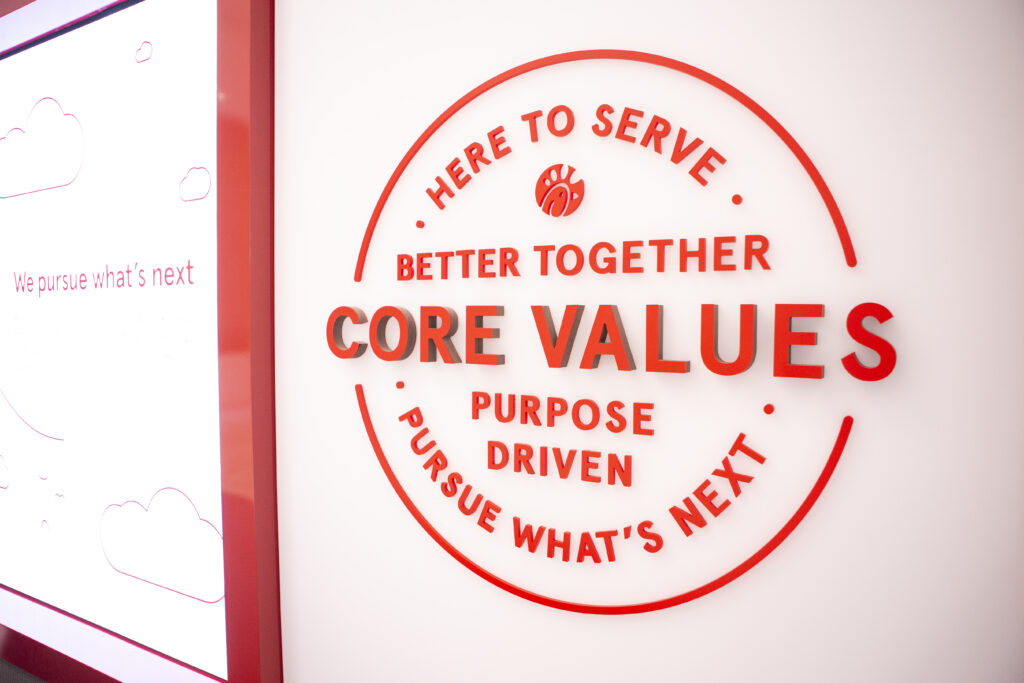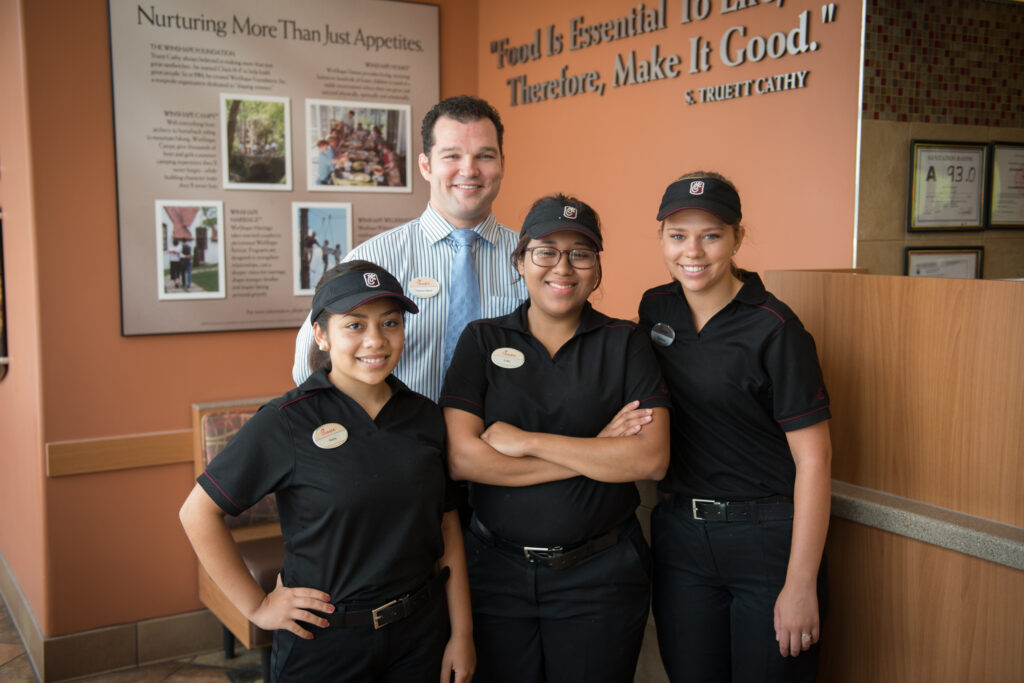On a Mission to be the World’s Most Caring Company
Founded 76 years ago right here in Hapeville, GA, Chick-fil-A and its Chairman Dan T. Cathy, recently received the 2022 goBeyondProfit Champion Award. Recognition by fellow business leaders of their success in consistently delivering care through meaningful daily moments that permeate the Chick-fil-A culture and result in decades of generosity.
During our goBeyondProfit interview with Dan Cathy, we explored the specifics of how the nation’s third largest fast-food company executes from generational roots of generosity, evolving over time and responding to today’s urgent needs. They are on a quest to be the world’s most caring company. And the secret ingredient appears to lie the little things, the subtleties of a lot of deliberate decisions and behaviors that permeate the entire organization.

Excerpts taken from the interview with Dan T. Cathy, Chairman, Chick-fil-A, Inc.
No Margin, No Mission
One of the favorite expressions for my dad is that “if there’s no margin, there’s no mission.” In other words, as business people, we’ve got to make a profit. We’ve got to make a profit just to sustain ourselves from one year to the next, so we can reinvest in the business going forward and take advantage of marketplace opportunities. But hopefully there’s going to be also some margin there, not just to recapitalize the business for the future, but also to share some of that profit with other needs within the community.
History of Hospitality
Well, you asked about the genesis of the Chick-fil-A business. It goes back to the Dwarf House opening of 1946. But the genesis of that was really my grandmother who operated a boarding house in southwest Atlanta. And that’s where my dad often said he learned how to shuck corn, shell peas, and wash dirty dishes. He worked with his mom there in that kitchen, and began to pick up nuances of how to flavor squash and beans and cook roast and chicken and on and on and on. In fact, he says the story about the origination of Chick-fil-A was watching his mother season chicken on Saturday night to be served for Sunday dinner the next day.
But dad got some generosity genes someplace along the line. And in fact, some of the employees made the comment at the Dwarf House that dad gave away so much food, they wondered if he was going to make a profit because he was giving so much food away.
Food is a really wonderful agent of hospitality, of kindness, of care, of concern, and always has been throughout civilization. And we were able to continue to grasp that element of hospitality and graciousness to help people cope and deal with issues and challenges that have gone on in life. We just perpetuated that as a family.
Purpose & Mission That Drive Performance
The highest statement that we have at Chick-fil-A is what we call our Chick-fil-A corporate purpose: to glorify God by being a faithful steward of all that’s entrusted to us and to have a positive influence on all who come in contact with Chick-fil-A. That’s the big, overarching why. That’s the stratosphere for us from a philosophical standpoint.
Culture within any organization really drives marketplace performance. Strong cultures are driven by a strong sense of purpose and significance, a purpose and calling that is beyond a transaction, that’s beyond something on a balance sheet, or a profit & loss statement, that can appeal to the higher purpose of who we are as humanity, as citizens. That’s what really drives effective leaders in communicating what that purpose is in a meaningful way, that everyone can identify with it.
But underneath that, we have a mission statement to be the world’s most caring company. And as we’ve thought about that, as we think about that, as we incubate and perpetuate that kind of thinking, what does it mean to be the world’s most caring company? We know that really, it’s the subtleties of a lot of behaviors that consistently happen all over the organization, embodied by leaders, lived out by leaders. But that leadership ripples throughout the whole organization, so that customers in drive-through lines, in our dining rooms, and other places see there’s a lot of little things that we do.

Responding to Community Needs
Our Chick-fil-A restaurant operators are independent contractors. They’re self-employed. We provide the capital and the brand, and all the systems so that the operators have all the pieces. But the operator, she is the individual that’s able to pull all that together to make it viable and meaningful for local communities that they may be in.
And we are one of the “first responders,” if you will, in times of crisis. During COVID, we were deemed an essential business and we were given special provisions to be able to continue to operate our business. Many of these school systems that were shut down and others, that was the sole source of food service for many students, needed other avenues of being able to meet those needs. So we were able to mobilize.
In fact, some of our communities, actually asked Chick-fil-A operators for their logistics expertise to help stand up COVID testing site. So our operators jumped to the rescue. And it came back as tremendous loyalty as a result of Chick-fil-A restaurant operators responding so effectively.
Little Moments of Kindness
I love the definition of a restaurant. It’s a French word, the genesis of it, that means a place of restoration. And so as we think about how profound that idea is that a restaurant, even cars going through a drive-through, that we’re a place of restoration, not just caloric restoration, but also even emotional restoration. And it’s the little moments of kindness, the little acts of selflessness that we could do to other people that really begins to minister in their life.

A couple of years ago, I was having a busy morning. I was going through the Chick-fil-A drive-through on my way into work. And I remember as I went through, this lady handed me my sack. And it’s such a simple thing. I mean, it was really a little thing but as she handed me my food, she looked at me in the eye, and she said, “I hope you have a really good day today.”
It was a nanosecond of time. She simply said with a lot of sincerity, “I hope you have a really good day today.” And when I left there, man, I don’t know what was in that sack. I don’t remember that at all, but I sure remember how she made me feel. And if we can affect and touch people’s lives through the little things, then I think we can count our life as success.
Standing in the Gap
Well, one of the things that we should aspire to have in life is the ability to see what’s going on around us. You know, we can see, but do we really see?
I know in 2020, just two years ago, the cover, a veil was opened. And we began to see how elements of our society, particularly the African American community, have a lot of unseen hardships that they are dealing with that I think many other people, including myself, were oblivious to. And so it’s the eyes to see, it’s the ears to hear, but it’s also the heart that cares. It’s seeing and hearing, but it’s also a sense of conviction in heart, that we need to take action. We need to do something about the situation.
We need to stand in the gap. If we’ve got inequities in our society, in education and medical care, justice, and on and on and on, all these inequities, we need, in our generation, to step up. And by a sense of our own personal moral compass and our moral convictions we need to stand in the gap and we need to speak out.
I love the quote from Martin Luther King that says, “We begin to die when we fail to care about things that really matter.” And we see these issues around us. We don’t need just to see them or hear about them, but we need to ask ourselves, do we see the opportunity that we have to be able to stand in the gap? I’m all for elected officials, but I’m also really for the private sector that can move a lot faster to stand in the gap to address these issues.
Reputation is really a lot of choices and decisions we make, and not just the big things, but the little things that we might do that may go unnoticed. And I have observed in leaders that I admire the most, that it’s the subtleties of their behavior, their conduct, the way they embody the values of generosity by their own personal conduct, that is most inspiring to me. And I hope that at Chick-fil-A and this recognition we’re receiving, I hope that it’ll continue to inspire others.
